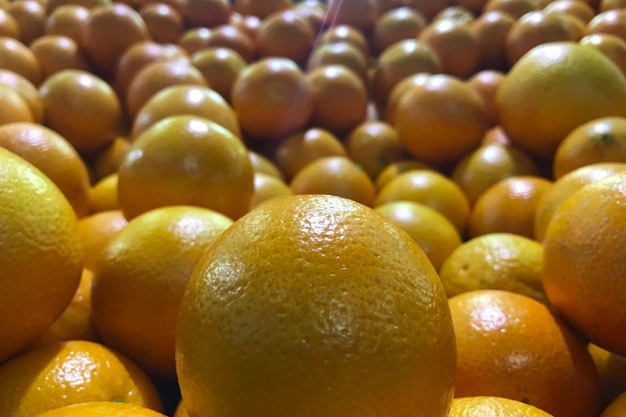Egyptian oranges will hit the market in December, marking the start of the next citrus season. This season begins against the backdrop of the major crisis in the Red Sea, which profoundly disrupted the previous season. To date, there is no sign that this tense situation will be resolved any time soon. How are the Egyptian players adapting to this situation? Omar El Naggar, Managing Director of Bloomfruit, shares his insights.

Exporters learn to live with the crisis
As the crisis looks set to take on even more serious dimensions with the intensification of conflict in the Middle East, El Naggar assures that the Egyptian citrus industry is adapting: "All Egyptian exporters of fresh oranges are increasingly concerned about the risks posed by piracy and other logistical challenges in the region. At the same time, we have adopted a number of strategies to deal with these issues and ensure the safe and prompt delivery of our produce. There are different courses of action, and managers can play a range of cards in overcoming this difficult crisis."
It is worth recalling that not all shipping companies are targeted by the Houthi attacks in Yemen. "This is a first way of adapting to the situation," says El Naggar. "Exporters are already diversifying their logistics solutions to avoid the most vulnerable lines affected by piracy. A few shipping lines are still able to offer secure routes through the Red Sea to destinations such as Singapore, Malaysia, Hong Kong, and parts of Southeast Asia in 28 days, and possibly to China in less than 40 days. Yes, there are a few of them, but they exist. There are ongoing discussions with these companies and they will make their plans for the next citrus season known soon."
The crisis calls for greater involvement of Egyptian exporters and collaboration with shipping companies, according to El Naggar. He explains: "We work closely with trusted shipping lines that have security protocols in place for routes exposed to piracy. Many shipping companies have advanced security measures, including the use of faster vessels and collaboration with anti-piracy naval forces. We focus more on companies whose enhanced security vessels follow certain security protocols, including the naval escorts of international coalitions patrolling the area. The use of vessel tracking systems and communication with anti-piracy centers are also commonplace."
Other means of action, at the operational level, are also possible, says the exporter: "The timing and speed of shipments are important parameters. Egyptian exporters have to closely monitor the situation and schedule their shipments at times when pirate activity is less likely, avoiding, for example, the most intense piracy seasons. Faster ships and shorter shipping windows reduce exposure to dangerous areas. In terms of insurance, we prioritize specialized marine insurance policies that cover piracy-related risks. This helps mitigate potential financial losses due to delays or disruptions caused by piracy."
Despite all these measures, transit time is still likely to be impacted by heavy demand on the few shipping lines still operating in the Red Sea, not to mention exporters who still have to make the detour around Cape of Good Hope. El Naggar advises: "Improved packaging and storage solutions are becoming a necessity. Egyptian exporters are improving packaging and cold chain management to maintain the quality of fresh oranges during longer shipping times, in case detours or delays occur. Fortunately, most Egyptian orange varieties are among the most durable and solid in the world. Last season, we exported Valencia oranges to China after 60 days at sea; they arrived in excellent condition and sold well on retail shelves."

Omar El Naggar, managing director of BloomFruit Consultants
A more optimistic outlook for next season
Maintaining shipments to Asia is vital for two reasons: Asian markets account for just over 30% of Egyptian orange exports. In addition, maintaining supply to Asia will help avoid the nightmare scenario of oversupply in Europe, which caused prices to collapse last season. According to El Naggar, the outlook for next season is more optimistic. He explains: "I think that Asian markets will have stronger demand this year for Egyptian oranges due to the successful arrival of many ships last season that stayed in transit for more than 60 days and, despite this, delivered produce in good condition. In addition, I believe that global demand for Egyptian oranges will be stronger this year due to the global shortage of supply and the increased demand for oranges in sectors other than the fresh produce market."
Last season, when the Red Sea crisis had just begun, orange volumes rose sharply by around 25% compared with the previous season, due to an increase in cultivated areas, better weather conditions, and improved sizes - an abundance that worked against exporters' interests and, along with the Red Sea crisis, contributed to an oversupply in Europe. For next season, many Egyptian growers say that volume control is necessary to adapt to the crisis, but planting decisions remain decentralized and individual, and we'll have to wait and see whether volumes will actually be reduced. El Naggar, for his part, shares, "Volume control is absolutely a key factor in the success of next season, but only the market will be able to determine which volumes will be optimal. I think we can expect volumes to be down 12-15% on last season, but this has to be taken with caution, and the next period will bring more visibility."
Last season, when the crisis was still a novelty and Egyptian exporters were nose-diving into an unprofitable campaign, they had already succeeded in opening up new markets to mitigate the situation. Egyptian oranges are exported to over 120 countries, but some destinations draw negligible quantities, and Egyptian exporters have been trying to increase their volumes in these markets. El Naggar says: "We've had varying degrees of success, and some new markets have proved dynamic, such as Brazil, Canada, and six or seven other countries. It has to be said that some of these markets don't pay premium prices for premium quality, but they will still have a positive impact on the export volume of the Egyptian market and remain a mitigating factor to the current situation."
Finally, an important area of adaptation to the Red Sea crisis remains managing oversupply in Europe. Indeed, from the very first months of last season, European importers were able to leverage the situation and impose more flexible payment terms. Worse still, exports of Egyptian oranges on commission increased dramatically in Europe last season, a practice decried by Egyptian players. El Naggar says: "There will always be players who agree to sell on commission, but I expect there to be fewer of them next season thanks to the general improvement I explained earlier. Some blind investors who engage in this practice to make a quick buck will be less motivated next season because of the financial losses incurred last season."
"We're also working to enhance the value of our produce here in Egypt. In this context, I'd like to announce the launch of a new orange concentrate factory, Sahara for Fruit Processing, where I'm acting as managing director. We're launching our product this winter, and this investment strengthens our resilience in a turbulent market," concludes El Naggar.
For more information:
Omar El Naggar
Bloomfruit Consultants
Tel: +202 2754 5156 / +20 100 105 0545
Email: [email protected]










